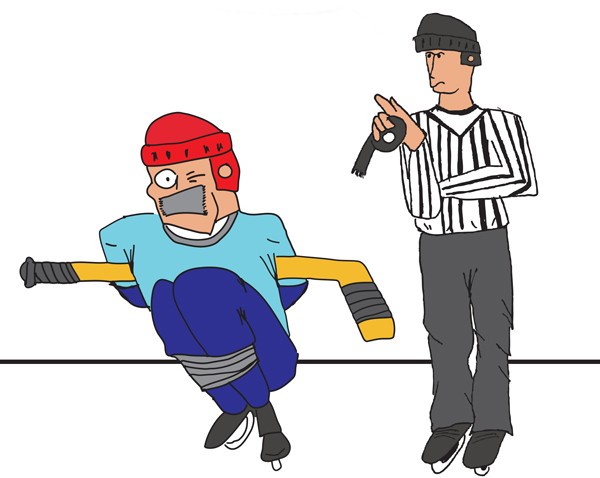League of extraordinary dictators
Alex Burrows’ fine latest in NHL’s policy of muzzling criticism
The 20th century has witnessed the growth and spread of freedom throughout the world. It is generally accepted that human beings live better lives when they are free to live and think as they please. The idea of a totalitarian system of government is so abhorrent to us that we fought the Second World War over it, if I may oversimplify.
How ironic it is, then, that Canadians would choose to support, even celebrate, one of the most despotic regimes in the Western Hemisphere. Canadians pour millions of dollars of their personal resources every year into a regime that is intolerant of criticism from those under its authority. It is even considered an important part of Canadian culture.
The regime I refer to is the National Hockey League, which has demonstrated once again that under no circumstances will it stand to let an individual under its authority challenge or criticize an employee of the league, much less the league itself.
To bring you up to speed, on Jan. 11, Vancouver Canucks forward Alex Burrows felt he was targeted by the referee and assessed unfair penalties, arguably costing his team the win that night. After the game, he called the ref out in front of a crowd of media, saying, among other things, that the ref was “making bad calls” and that the penalties called against him were “personal” and ultimately “changed the game.”
For his remarks, Burrows was handed a $2,500 fine from the league. The referee, Stephane Auger, was given a talking-to, but has not been punished as of this writing and likely won’t be.
We can debate whether Burrows is right or wrong until we’re blue in the face. By now hockey fans have heard every opinion on that argument. It is more important to question the league’s policy of punishing anyone who accuses its officials of any wrongdoing.
The NHL rulebook is crystal clear: according to rule 40.1, “a player … shall not challenge or dispute the rulings of an official before, during or after a game.”
The punishment for such an offense is just as clear: under NHL by-law 17.4(a), “[any player] who makes a public statement that is critical of the League Officiating Staff shall be liable to a fine.”
Any avid sports fan will attest that, even with the best of intentions, there are times when an official will quite simply blow a call. The players involved will understandably be upset and, if they so desire, should rightfully be allowed to call that decision wrong.
Referees are human. I’ll be the first to tell you that hockey referees have an extremely difficult job, so it is understandable that on occasion they will err in judgment. But even so, why should they be immune from criticism?
The usual reason offered by the NHL has something to do with the offender having called the league into disrepute or demeaned the character of the particular referee. Regarding the latter, I can’t imagine a few post-game comments would be more demeaning than the slew of vulgarities they endure every night.
They may have a point with the former, but is that something that needs to be formally punished? Fans are well aware that officials will sometimes make wrong calls, so a player stating the obvious isn’t going to shock anyone. Certainly, no one will stop going to hockey games on account of that.
Alex Burrows is not the first NHLer to pay for his words. He won’t be the last.
There is no profession in the world that is so untouchable as to be above criticism, but that goes ignored in the hallowed NHL.
Oh, the good old hockey game.
Josh Bernier is a second-year politics student at the University of Winnipeg.
Published in Volume 64, Number 16 of The Uniter (January 21, 2010)








